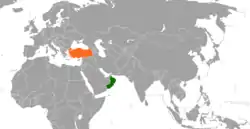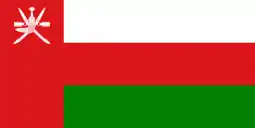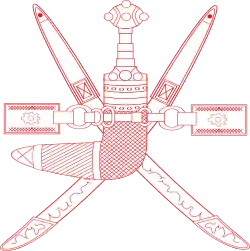Oman–Turkey relations
Oman–Turkey relations are the foreign relations between Oman and Turkey. Turkey’s historic relationship with Oman has wavered between friendly indifference and courtship, but mutual aloofness was set aside in 2002 when the new Turkish government embraced a policy of engagement with Oman.[3]
 | |
Oman |
Turkey |
|---|---|
| Diplomatic mission | |
| Omani Embassy, Ankara | Turkish Embassy, Muscat |
| Envoy | |
| Ambassador Qasım Mohamad Salim Al Salhi[1] | Ambassador Ayşe Sözen Usluer[2] |
Turkey formally recognized Oman in 1970, which declared its independence the same year and diplomatic relations between the two countries were established in 1973. The two countries collaborated in their support for the 1979 Camp David accords and were among the four majority-Muslim states that did not break relations with Egypt after the signing of the Egyptian-Israeli Peace Treaty in 1979.[4]
Following the elimination of Iraq as a counterweight to Iran after the 2003 invasion of Iraq, the Gulf Cooperation Council (GCC), which includes Oman, has fostered stronger ties with Turkey in an attempt to enhance GCC security.[4]
Recently, both countries have been the targets of hostile UAE spying:
- In December 2010, Oman discovered a spy network operated by the United Arab Emirates which collected information on Oman's military and government. They were reportedly interested in who would replace Qaboos as his heir and about Oman's relations with Iran.[5][6]
- In 2019, it was reported that Project Raven, a UAE clandestine surveillance and hacking operation targeting other governments, militants and human rights activists critical of the UAE monarchy specifically targeted Oman and Turkey,[7] succeeded in hacking a device belonging to Yusuf bin Alawi, the Omani Minister of Foreign Affairs.[8][9]
Historical background
Oman was controlled by the Seljuk Empire 1000-1054[10] and after a period of Portuguese colonization, Oman became part of the Ottoman Empire following the recapture of Muscat in 1552 until 1698.[11]
Country comparison
| Flag |  |
 |
| State Emblem / National Emblem |  |
 |
| Population | 4,829,473 | 83,154,997 |
| Area | 309,500 km2 (119,500 sq mi) | 783,356 km2 (302,455 sq mi) |
| Population density | 15/km2 (38.8/sq mi) | 105/km2 (271.9/sq mi) |
| Capital | Muscat | Ankara |
| Government | Unitary absolute monarchy | Unitary presidential constitutional republic |
| Current Leader | Sultan Haitham bin Tariq | President Recep Tayyip Erdoğan Vice President Fuat Oktay |
| Official languages | Arabic | Turkish |
| Main religions | Islam | 97.6% Islam, 1.1% Judaism, 0.3% Christianity |
| Ethnic groups | 44.9% Omanis, 55.1% Expatriates | 85% Turkish, 9% Kurdish 6% Others |
| Human Development Index (HDI) | 0.834 (very high)[12] — 47th | 0.806 (very high)[12] — 59th |
| GDP (PPP) | $203.959 billion ($47,366 per capita) | $2.464 trillion[13] ($29,326 per capita) |
Official visits
| Guest | Host | Place of visit | Date of visit |
|---|---|---|---|
| Al Alam Palace, Muscat | January 29, 2017[14] | ||
| Al Alam Palace, Muscat | October 28-29, 2017[14] | ||
| OIC Extraordinary Summit on Al-Quds, Istanbul | May 18, 2018[14] | ||
Economic relations
- Trade volume between the two countries was 489 million USD in 2018 (Turkish exports/imports: 422/67 million USD).[15]
Cultural relations
Turkish television drama have become massively popular across in Oman, as millions of Arabs stop everything daily to view the latest episode of shows such as Hareem Al Sultan and Fatima, going a long way to promote a positive image of Turkey in Oman.[16]
References
- "Omani Ambassador Presents His Credentials to President Erdoğan". Presidency of the Republic of Turkey.
- "Republic of Turkey Embassy in Muscat". Ministry of Foreign Affairs of Turkey.
- Tim Reid (August 29, 2012). "Turkey's eastern trading bet pays off". Financial Times.
- Hürsoy, S. (2013). Turkey’s Foreign Policy and Economic Interests in the Gulf. Turkish Studies, 14(3, Autumn), 503–519.
- "BBC News - Oman uncovers 'spy network' but UAE denies any links". BBC News. Retrieved 21 February 2015.
- "Oman says busts UAE spy network, UAE denies role". Reuters. Retrieved 21 February 2015.
- "UAE buys its way toward supremacy in Gulf cyberwar, using US and Israeli experts". Ars Technica. 1 February 2019.
- UAE used cyber super-weapon to spy on Iphones of foes, by Joel Schectman and Christopher Bing, January 30, 2019, Reuters
- Inside the UAE's secret hacking team of American mercenaries, by Christopher Bing and Joel Schectman, January 30, 2019, Reuters
- Uzi Rabi. Emergence of States in a Tribal Society: Oman Under Sa'Id Bin Taymur. Emergence of States in a Tribal Society: Oman Under Sa'Id Bin Taymur.
- Holt, Peter Malcolm; Lambton, Ann K. S. and Lewis, Bernard (1977) The Cambridge history of Islam, Cambridge University Press, ISBN 0521291364.
- "2019 Human Development Index Ranking | Human Development Reports". hdr.undp.org. Retrieved 2020-08-04.
- "International Monetary Fund, Report on selected countries". International Monetary Fund.
- "Bilateral Political Relations between Turkey and Oman". Ministry of Foreign Affairs of Turkey.
- "Turkey-Oman Economic and Trade Relations". Ministry of Foreign Affairs of Turkey.
- David Rohde (March 9, 2012). "The Islamic World's Culture War, Played Out on TV Soap Operas". The Atlantic.